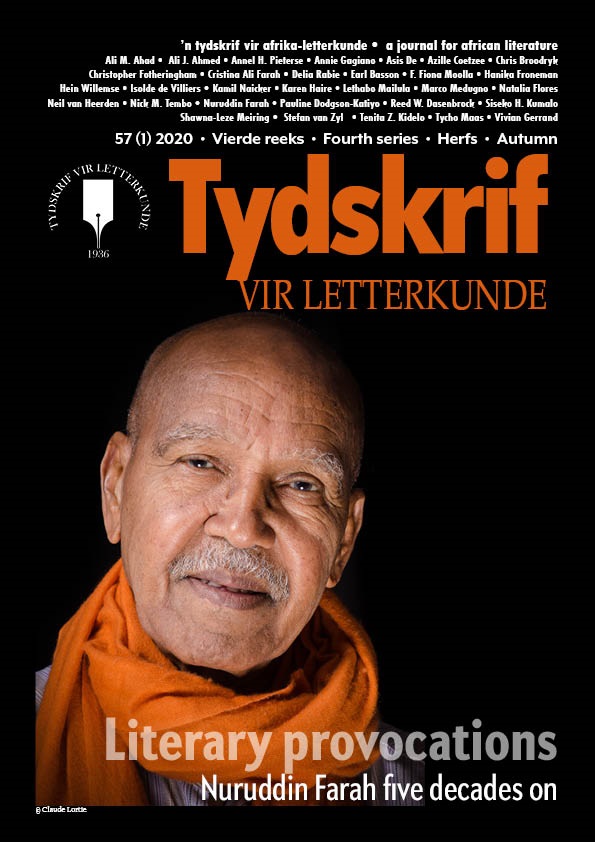Perceiving precarity and extremism in Nuruddin Farah’s North of Dawn
DOI:
https://doi.org/10.17159/2309-9070/tvl.v.57i1.8079Keywords:
precariat, Somali migrant community, extremism, social marginalization, African migration literature, traumaAbstract
Somali citizens, both at home and abroad, have been reduced to a life of uncertainty, instability and insecurity. This article considers Somalis as part of the ‘precariat’ (as theorized by Pierre Bourdieu, Guy Standing, and others). Drawing on critical terrorism and trauma scholarship, the article gauges the experiences of the precariat subject, highlighting how these experiences affect the daily lives of the Somali migrant community in Nuruddin Farah’s North of Dawn (2018). The aim of this article is to consider the relationship among precarity, extremism and the postcolonial émigré with regard to the contingent and fractious relations established by and between the Somali migrant characters and their hosts in the novel. Whereas predominant framings of precarity are characterized by labor insecurity, lack of any stable economic identity, and the fear of losing what one has, my argument in this article is that extremism is both a response to and attendant agent of precarity as presented in the novel. My contention is that Farah engages the precariat as extremist in the narrative present of the novel, highlighting the ways in which those that face social identification and marginalization are both at risk and risky to others.
Downloads
References
Alden, Patricia & Louis Tremaine. Nuruddin Farah. Twayne, 1999.
Arendt, Hannah. Eichmann in Jerusalem: A Report on the Banality of Evil. Viking, 1963.
American Psychiatric Association. Diagnostic and Statistical Manual of Mental Disorders. 5th Edition: DSM–5. American Psychiatric, 2013.
Beck, Ulrich. Risk Society: Towards a New Modernity. Sage, 1992.
Beck, Ulrich. World at Risk. Polity, 2007.
Boehmer, Elleke & Stephen Morton. “Introduction: Terror and the Postcolonial.” Terror and the Postcolonial, edited by Elleke Boehmer & Stephen Morton. Blackwell, 2010, pp. 1–24.
Bourdieu, Pierre et al. The Weight of the World: Social Suffering in Contemporary Society. Stanford U P, 1999.
Charles, Ron. “North of Dawn by Nuruddin Farah, Review: The Somali Novelist Channels the Pain of his Sister’s Death in a Terror Attack.” Independent. 21 Dec. 2018. www.independent.co.uk/arts-entertainment/books/reviews/north-of-dawn-nuruddin-farah-book-review-terrorism-sister-novel-a8694206.html. Accessed 24 Dec. 2019.
Doyle, Aaron. “Introduction: Trust, Citizenship and Exclusion in the Risk Society.” Risk and Trust: Including and Excluding the Citizen? edited by Law Commission of Canada. Fernwood, 2009, pp. 7–22.
Farah, Nuruddin. “A Country in Exile.” World Literature Today vol. 72, no. 4, 1998, pp. 713‒15. DOI: https://doi.org/10.2307/40154257.
Farah, Nuruddin. North of Dawn. Riverhead, 2018.
Finn, Melanie. “A Novel of Culture Clash Grapples with the Grief of a Suicide Bomber’s Family.” The New York Times. 4 Jan. 2019. www.nytimes.com/2019/01/04/books/review/north-of-dawn-nuruddin-farah.html. Accessed 26 Dec. 2019.
Haleem, Irm. The Essence of Islamist Extremism: Recognition through Violence, Freedom through Death. Routledge, 2012.
Han, Clara. “Precarity, Precariousness, and Vulnerability.” Annual Review of Anthropology vol. 47, 2018, pp. 331–43. DOI: https://doi.org/10.1146/annurev-anthro-102116-041644.
Hassan, Nasr. “An Arsenal of Believers: Talking to the ‘Human Bombs.’” Paper presented at the International Society of Political Psychology Conference, 16–19 July, Berlin, Germany, 2002.
Herman, Judith Lewis. Trauma and Recovery: The Aftermath of Violence—From Domestic Abuse to Political Terror. Basic, 1992.
Hitchcock, Peter. The Long Space: Transnationalism and Postcolonial Form. Stanford U P, 2010.
Hutchins, Reid. “Islam and Suicide Terrorism: Separating Fact from Fiction.” Counter Terrorist Trends and Analyses vol. 9, no. 11, 2017, pp. 7–11.
Lyons. Terrence & Ahmed I. Samatar. Somalia: State Collapse, Multilateral Intervention, and Strategies for Political Reconstruction. The Brookins Institution, 1995.
Menkhaus, Ken. “Governance without Government in Somalia Spoilers, State Building, and the Politics of Coping.” International Security vol. 31, no. 3, 2007, pp. 74–106. DOI: https://doi.org/10.1162/isec.2007.31.3.74.
Mohamed, Hassan A. “Refugee Exodus from Somalia: Revisiting the Causes.” Refugee: Canada’s Journal on Refugees vol. 14, no. 1, 1994, pp. 6–10.
Odhiambo, Tom & Godwin Siundu. “Journeying into Eastern African Literary and Cultural Studies.” Eastern African Literary and Cultural Studies vol. 1, nos. 1–2, 2014, pp. 1–6. DOI: https://doi.org/10.1080/23277408.2014.982350.
Ridout, Nicholas & Rebecca Schneider. “Precarity and Performance: An Introduction.” Arcade: Literature, the Humanities, and the World. arcade.stanford.edu/content/precarity-and-performance-introduction. Accessed 24 Dec. 2019.
Said, Edward W. “The Essential Terrorist.” Blaming the Victims: Spurious Scholarship and the Palestinian Question, edited by Edward W. Said & Christopher Hitchens. Verso, 1988, pp. 149–58.
Schwartz, Allan. “Hatred, Terrorism and Trauma.” Mentalhelp.net. 27 Nov. 2006. www.mentalhelp.net/articles/hatred-terrorism-and-trauma/. Accessed 24 Dec. 2019.
Silke, Andrew. “Becoming a Terrorist.” Terrorists, Victims and Society: Psychological Perspectives on Terrorism and its Consequences, edited by Andrew Silke. Wiley, 2003, pp. 29–54.
Silke, Andrew. “Cheshire-cat logic: The recurring theme of terrorist abnormality in psychological research.” Psychology, Crime and Law vol. 4, 1998, pp. 51–69. DOI: https://doi.org/10.1080/10683169808401747.
Standing, Guy. The Precariat: The New Dangerous Class. Bloomsbury Academic, 2011.
Standing, Guy. “Meet the Precariat. The New Global Class Fueling the Rise of Populism.” World Economic Forum. 9 Nov. 2016. www.weforum.org/agenda/2016/11/precariat-global-class-rise-of-populism/. Accessed 24 Dec. 2019.
United Nations. “Plan of Action to Prevent Violent Extremism.” Seventieth Session. Dec. 2015. www.un.org/en/ga/search/view_doc.asp?symbol=A/70/674. Accessed 24 Dec. 2019.
Wilkinson, Matthew L. N. The Genealogy of Terror: How to distinguish between Islam, Islamism and Islamist Extremism. Routledge, 2019.
Wimmer, Jeffrey & Thorsten Quandt. “Living in the Risk Society: An interview with Ulrich Beck.” Journalism Studies vol. 7, no. 2, 2006, pp. 336–47. DOI: https://doi.org/10.1080/14616700600645461.
Zulaika, Joseba. Terrorism: The Self-Fulfilling Prophecy. U of Chicago P, 2009.
Downloads
Published
Issue
Section
License
Copyright (c) 2020 Tydskrif vir Letterkunde

This work is licensed under a Creative Commons Attribution-ShareAlike 4.0 International License.


 https://orcid.org/0000-0001-6465-6584
https://orcid.org/0000-0001-6465-6584


.png)